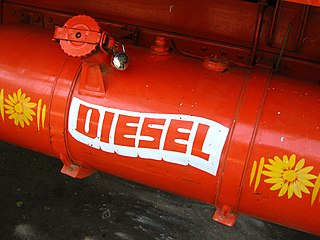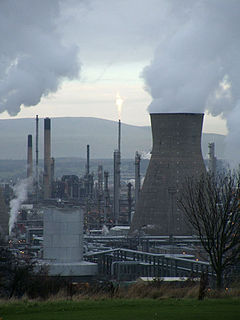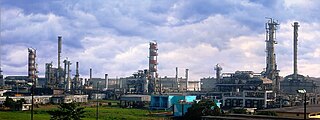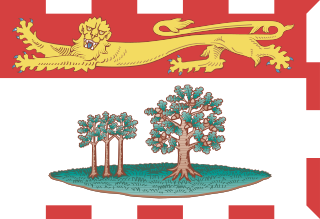Kerosene, also known as paraffin, lamp oil, and coal oil, is a combustible hydrocarbon liquid which is derived from petroleum. It is widely used as a fuel in an air industry as well as households. Its name derives from Greek: κηρός (keros) meaning wax, and was registered as a trademark by Canadian geologist and inventor Abraham Gesner in 1854 before evolving into a genericized trademark. It is sometimes spelled kerosine in scientific and industrial usage. The term kerosene is common in much of Argentina, Australia, Canada, India, New Zealand, and the United States, while the term paraffin is used in Chile, eastern Africa, South Africa, Norway, and in the United Kingdom. The term lamp oil, or the equivalent in the local languages, is common in the majority of Asia. Liquid paraffin is a more viscous and highly refined product which is used as a laxative. Paraffin wax is a waxy solid extracted from petroleum.

Diesel fuel in general is any liquid fuel used in diesel engines, whose fuel ignition takes place, without any spark, as a result of compression of the inlet air mixture and then injection of fuel. Diesel engines have found broad use as a result of higher thermodynamic efficiency and thus fuel efficiency. This is particularly noted where diesel engines are run at part-load; as their air supply is not throttled as in a petrol engine, their efficiency still remains very high.

Oil refinery or petroleum refinery is an industrial process plant where crude oil is transformed and refined into more useful products such as petroleum naphtha, gasoline, diesel fuel, asphalt base, heating oil, kerosene, liquefied petroleum gas, jet fuel and fuel oils. Petrochemicals feed stock like ethylene and propylene can also be produced directly by cracking crude oil without the need of using refined products of crude oil such as naphtha.
A fuel tax is an excise tax imposed on the sale of fuel. In most countries the fuel tax is imposed on fuels which are intended for transportation. Fuels used to power agricultural vehicles, and/or home heating oil which is similar to diesel are taxed at a different, usually lower rate. The fuel tax receipts are often dedicated or hypothecated to transportation projects so that the fuel tax is considered by many a user fee. In other countries, the fuel tax is a source of general revenue. Sometimes, the fuel tax is used as an ecotax, to promote ecological sustainability. Fuel taxes are often considered regressive taxes.
Heating oil is a low viscosity, liquid petroleum product used as a fuel oil for furnaces or boilers in buildings. Home heating oil is often abbreviated as HHO.

Petroleum products are materials derived from crude oil (petroleum) as it is processed in oil refineries. Unlike petrochemicals, which are a collection of well-defined usually pure chemical compounds, petroleum products are complex mixtures. The majority of petroleum is converted to petroleum products, which includes several classes of fuels.
Crack spread is a term used on the oil industry and futures trading for the differential between the price of crude oil and petroleum products extracted from it. The spread approximates the profit margin that an oil refinery can expect to make by "cracking" the long-chain hydrocarbons of crude oil into useful shorter-chain petroleum products.
The Wilson Fuel Company Limited, often shortened to Wilson Fuel, is an independent petroleum wholesaler, distributor and retailer headquartered in Truro, Nova Scotia. Wilson Fuel brands itself as the largest "independent" home heating fuel and gasoline retailer in Atlantic Canada; this is usually in reference to the fact that the company is a medium-scale retailer, as opposed to its competitors which are refiners and large-scale retailers.

Petroleum pricing in Nova Scotia is based on the Petroleum Products Pricing Act which governs the wholesale and minimum and maximum price of gasoline and diesel fuels that are authorised in Nova Scotia.

The usage and pricing of gasoline results from factors such as crude oil prices, processing and distribution costs, local demand, the strength of local currencies, local taxation, and the availability of local sources of gasoline (supply). Since fuels are traded worldwide, the trade prices are similar. The price paid by consumers largely reflects national pricing policy. Some regions, such as Europe and Japan, impose high taxes on gasoline (petrol); others, such as Saudi Arabia and Venezuela, subsidize the cost. Western countries have among the highest usage rates per person. The largest consumer is the United States, which used an average of 368 million US gallons each day in 2011.

Petron Corporation is the largest oil refining and marketing company in the Philippines, supplying more than a third of the country’s oil requirements. It operates a refinery in Limay, Bataan, with a rated capacity of 180,000 barrels per day (29,000 m3/d). From the refinery, Petron moves their products mainly by sea to 32 depots and terminals in the country. They operate a lube oil blending plant at their Pandacan Terminal, where it manufactures lubes and greases.

Coryton Refinery was an oil refinery in Essex, England, on the estuary of the River Thames 28 miles (45 km) from central London, between Shell Haven Creek and Hole Haven Creek, which separates Canvey Island from the mainland.

The United Refining Company is an oil company in Warren, Pennsylvania. The company operates an oil refinery in Warren that can process 70,000 barrels of oil into gasoline, diesel fuel and other petroleum distillates per day. It distributes gasoline under the Kwik Fill and Keystone brands.
The use of biofuels varies by region and with increasing oil prices there is a renewed interest in it as an energy source.

The Chevron Richmond Refinery is a 2,900-acre (1,200 ha) petroleum refinery in Richmond, California, on San Francisco Bay. It is owned and operated by Chevron Corporation and employs more than 1,200 workers, making it the city's largest employer. The refinery processes approximately 240,000 barrels (38,000 m3) of crude oil a day in the manufacture of petroleum products and other chemicals. The refinery's primary products are motor gasoline, jet fuel, diesel fuel and lubricants.

Petroleum refining processes are the chemical engineering processes and other facilities used in petroleum refineries to transform crude oil into useful products such as liquefied petroleum gas (LPG), gasoline or petrol, kerosene, jet fuel, diesel oil and fuel oils.

Eastern Refinery Limited or ERL is the sole country-owned oil refinery in Bangladesh. Eastern Refinery Limited, a subsidiary of Bangladesh Petroleum Corporation, plays a vital role in supplying around 40% of country’s current petroleum products demand and thus maintains stability in Petroleum, Oil and Lubricants (POL) Products market of the country. ERL sometimes becomes the only fall back system available, to avoid products crisis in the face of disruption of products’ import.
The oil and gas industry in India dates back to 1889 when the first oil deposits in the country were discovered near the town of Digboi in the state of Assam. The natural gas industry in India began in the 1960s with the discovery of gas fields in Assam and Gujarat. As on 31 March 2018, India had estimated crude oil reserves of 594.49 million tonnes (MT) and natural gas reserves of 1339.57 billion cubic meters (BCM).













